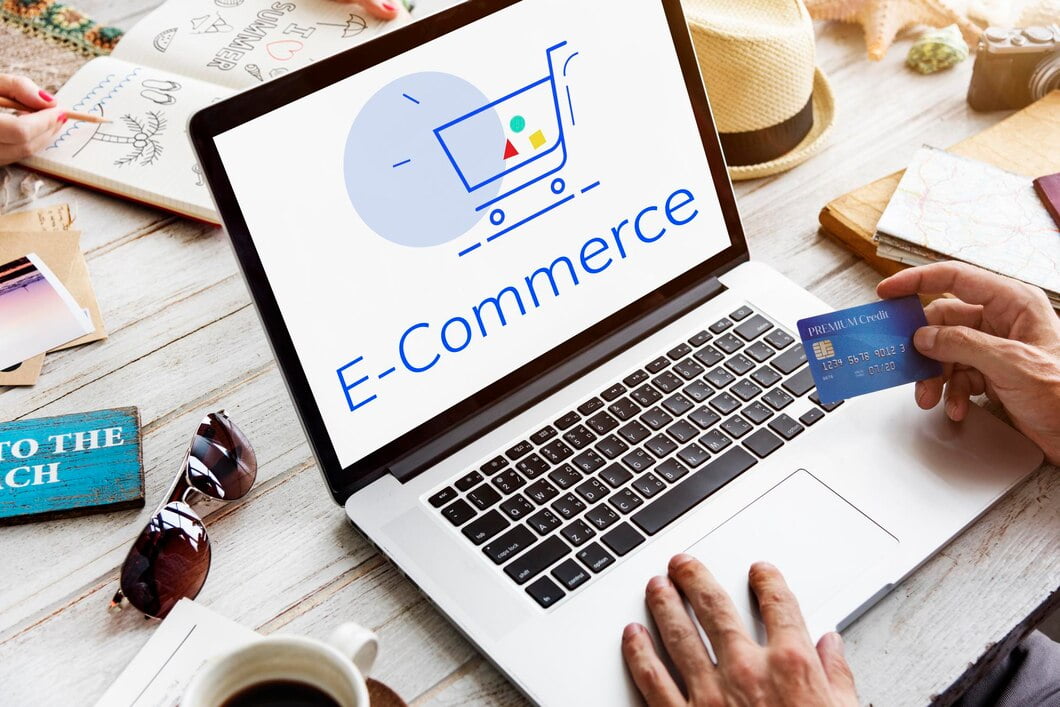E-commerce has revolutionized the way we buy and sell products. In an increasingly connected world, e-commerce has emerged as a transformative force in global commerce, eliminating geographical and time barriers and offering a convenient shopping option for consumers around the world.

But with growing competition in the digital market, how can an online business stand out? The answer may lie in creating a blog for e-commerce. In this article you'll learn all about it. Follow along.
What is e-commerce?
E-commerce, or electronic commerce, refers to the buying and selling of goods or services using the internet, and the transfer of money and data to carry out these transactions. This business model covers a variety of types of transactions, from online retail, auctions and digital marketplaces to music and software services.
The essence of e-commerce lies in its convenience and efficiency. Through this modality, consumers can explore a wide range of products in virtual stores, compare prices and make purchases without leaving home and at any time.
For sellers, e-commerce offers access to a global market, reducing physical barriers and allowing them to operate 24 hours a day, seven days a week.
In addition, e-commerce also makes it possible to collect, analyze and use customer data to personalize the shopping experience, improve customer satisfaction and increase the visibility and sales of the online store.
Growth of e-commerce in recent years
The e-commerce sector has experienced exponential growth. Before the pandemic, the market was already expanding, but the lockdown accelerated this trend.
In Brazil, for example, there was a increase in the number of online sales of 27% in 2021 compared to the previous year. And since then, the sector has shown increasing promise: according to the ABComm (Brazilian Association of Electronic Commerce), by 2024 e-commerce is expected to earn more than R$ 205 billion.
These figures reflect not only a change in consumer habits, but also consumers' growing confidence in online shopping.
Advantages of e-commerce
E-commerce is not just a passing trend. It is a disruptive force that continues to shape the global economy, influencing how companies operate and how consumers shop. Here are some of its many advantages:
Democratizing access to the global market
E-commerce has made it easier for businesses to expand beyond physical borders, promoting international trade and opening up new markets for companies of all sizes. And all this at a reduced cost, since starting an online business generally requires less capital compared to a physical store.
Job creation
With the increase in online sales came the need to develop more sophisticated software solutions to manage online stores, process payments and protect consumer data. At the same time, the demand for efficient and fast delivery services has grown exponentially, resulting in a boom in the logistics industry.
Convenience and personalization
With e-commerce, consumers can store at any time, without having to go to a physical store. In addition, online stores can offer personalized recommendations based on the customer's behavior and purchase history.
Operational efficiency
With the adoption of e-commerce, many companies have seen significant improvements in revenue growth and profit margins, as well as higher asset turnover and reduced financial leverage. This is partly due to the operational efficiency that e-commerce provides, allowing companies to reduce costs with physical stores and reach customers in a more direct and personalized way.
Stimulating innovation
Finally, e-commerce has driven innovation in various sectors, from the development of new payment technologies to the implementation of digital marketing strategies and data analysis. Companies that adopt e-commerce experience digital transformation and use data to better understand their customers and optimize their product and service offerings.
Why is having an e-commerce blog important?
A blog is a powerful tool for any online business, and e-commerce is no different. An e-commerce blog helps guide Internet surfers to your online store, offering your business many benefits:
Improved SEO and online visibility
A blog is an invaluable tool for improving SEO (Search Engine Optimization) of your site. By creating relevant and valuable content, you increase the chances of your site appearing on the first pages of search engines. This means more visibility for your brand and more organic traffic to your online store.
Establishing authority in the market
By sharing knowledge and useful information, an e-commerce blog helps establish your brand as an authority in your niche. This builds trust with your audience, who come to see your store not just as a point of sale, but as a reliable source of information.
Customer engagement and loyalty
An e-commerce blog also allows you to create a deeper connection with your customers. By engaging with them through interesting and educational content, you foster a relationship that goes beyond the commercial transaction, encouraging brand loyalty.

Generating content for social networks
It's also worth noting that the blog's content can be used on social networks, expanding its reach and engagement. Each blog post can be transformed into multiple posts on the networks, creating a content ecosystem that feeds different marketing channels.
Increased sales conversion
Remember that a blog can be a powerful tool for converting visitors into buyers. After all, by providing detailed information about products and services, you can influence consumers' purchasing decisions, leading to an increase in sales.
Capturing leads for e-mail marketing
With an e-commerce blog, you can capture leads by offering quality content that encourages visitors to sign up for more information. This creates a valuable database for e-mail marketingwhich are crucial for business growth.
Competitive differentiation
Finally, it's worth pointing out that in a saturated market, having a blog for e-commerce can be the differentiator that puts your online store ahead of the competition. While many online stores ignore the power of the blog, those that invest in this tool stand out, offering added value to their customers.
Conclusion
As we've shown in this article, having a blog for e-commerce is more than a trend, it's an essential strategy for any online business that wants to grow and prosper in the digital age.
Much more than a series of posts, a blog represents the voice of your brand, the beating heart of your company. online presence and an open invitation for customers and visitors to enter the world you have created.
In other words, it's a digital channel that allows you to express values, share knowledge and build a community around your products and services. By adopting a blog for e-commerce, you inform, inspire, involve and turn your customer's interest into loyalty.
And now that you're convinced of the importance of integrating a blog into your e-commerce strategy, don't miss out on the opportunity to find out more about the website, e-commerce, blog and application development solutions offered by CMLO&CO.
With a team specialized in creating optimized platforms for the Internet, CMLO&CO can help your business reach new heights in the digital world. Visit our website to find out more about how we can boost your online presence.







